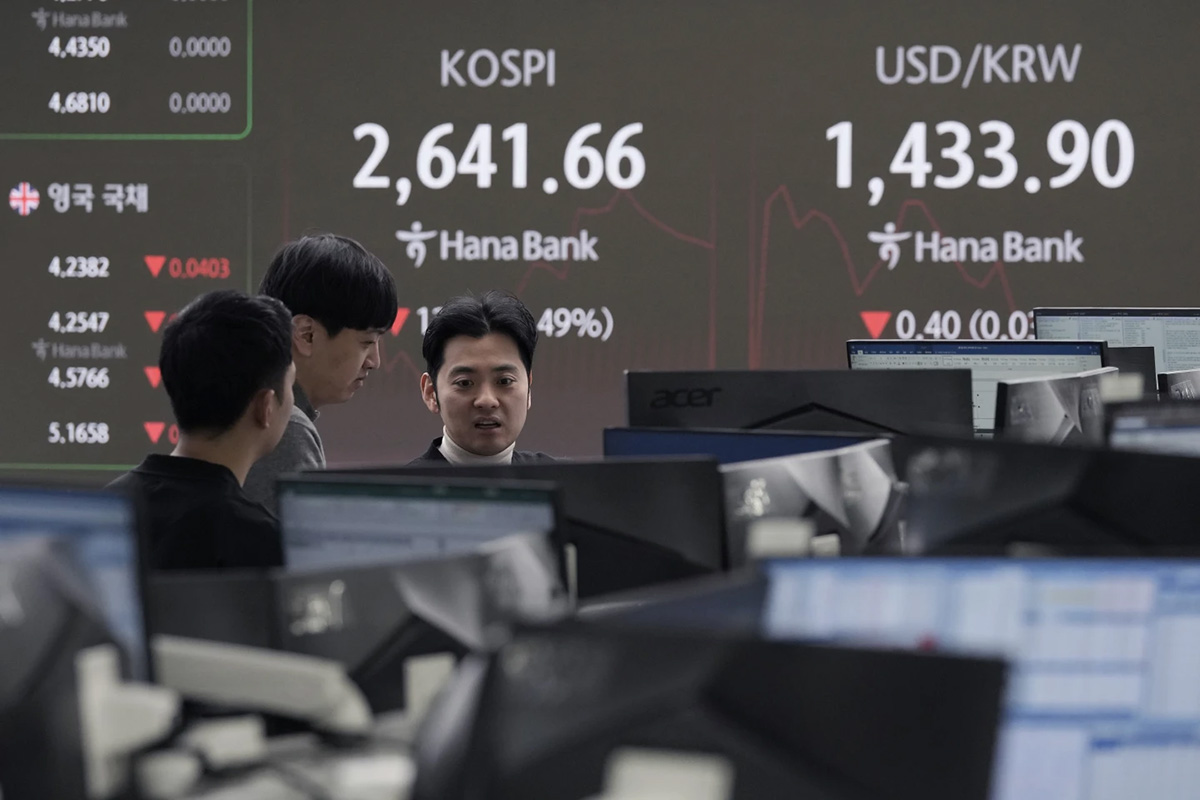
BANGKOK: Asian shares were mixed on Monday after US stocks fell sharply as reports indicated that the economy might be struggling due to concerns from consumers and businesses over President Donald Trump’s policies.
Markets were closed in Tokyo for a holiday.
Hong Kong’s Hang Seng index lost 0.6% to 23,348.82, and the Shanghai Composite index edged 0.1% lower to 3,375.29.
In Australia, the S&P/ASX 200 gained less than 0.1% to 8,300.80. South Korea’s Kospi lost 0.7% to 2,636.55, while the Taiex in Taiwan fell 0.6%. India’s Sensex declined by 0.9%.
On Friday, the S&P 500 sank 1.7% for its worst day in two months, closing at 6,013.13, after several weaker-than-expected reports on the US economy. The Dow Jones Industrial Average dropped 748 points, or 1.7%, to 43,428.02, while the Nasdaq composite tumbled 2.2% to 19,524.01.
A report from S&P Global suggested US business activity is close to stalling, with growth slowing to a 17-month low as activity unexpectedly shrank for US services businesses. Many in the survey reported pessimism over the future.
“Companies report widespread concerns about the impact of federal government policies, ranging from spending cuts to tariffs and geopolitical developments,” said Chris Williamson, chief business economist at S&P Global Market Intelligence. “Sales are reportedly being hit by the uncertainty caused by the changing political landscape, and prices are rising amid tariff-related price hikes from suppliers.”
“We have factored rising US tariffs and related countermeasures into our forecasts since December 2024, with trade weakness the primary cause of the projected slowdown in quarter-over-quarter global real GDP growth rates this year. Weaker investment is a key downside risk,” Ken Wattret, a global economist at S&P Global, said in a report.
A separate report indicated that US consumers are bracing for higher inflation, partly due to potential tariffs that could raise prices for a variety of imports. They broadly expect prices to be 4.3% higher in 12 months, a significant increase from their forecast of 3.3% inflation last month, according to a survey by the University of Michigan. This aligns with preliminary data in the survey earlier this month.
A third report noted that sales of previously occupied homes were weaker last month than economists had anticipated. Relatively high mortgage rates, along with expensive home prices, have been affecting sales.
Stocks of smaller companies, whose profits can be more closely tied to the strength of the US economy than large multinational rivals, fell more than the rest of the market. The Russell 2000 index of small stocks led the market decline.
Akamai Technologies experienced the sharpest drop in the S&P 500, despite the cybersecurity and cloud computing company reporting stronger profits for the latest quarter than analysts had expected. It lost a fifth of its value, falling 21.7%, as investors focused on its forecasts for revenue and other financial measures for the upcoming year, which fell short of analysts’ expectations.
Before Friday’s sharp drop, the S&P 500 had been heading for a week of almost no movement. Helping to lift stocks had been a steady stream of better-than-expected profit reports, which offset concerns about persistently high inflation that could prevent the Federal Reserve from providing more relief for the economy and financial markets through lower interest rates.
The Fed has been holding its main interest rate steady after sharply cutting it through the end of last year. At their last policy meeting in January, Fed officials suggested they might remain on hold for a while, given concerns about how Trump’s proposed tariffs and mass deportations of migrants, among other factors, could push up inflation.
While lower rates can boost the economy, they can also encourage spending, which puts upward pressure on inflation.
In other dealings early Monday, US benchmark crude oil shed 21 cents to $70.19 per barrel in electronic trading on the New York Mercantile Exchange. Brent crude, the international standard, fell 17 cents to $73.88 per barrel.
The US dollar rose to 149.28 Japanese yen from 149.24 yen. The euro climbed to $1.0512 from $1.0462.
By RSS/AP





